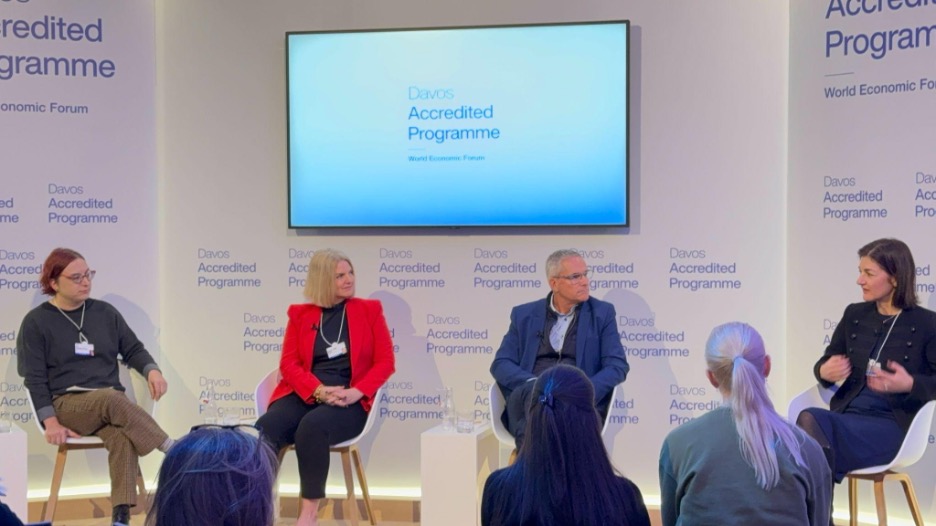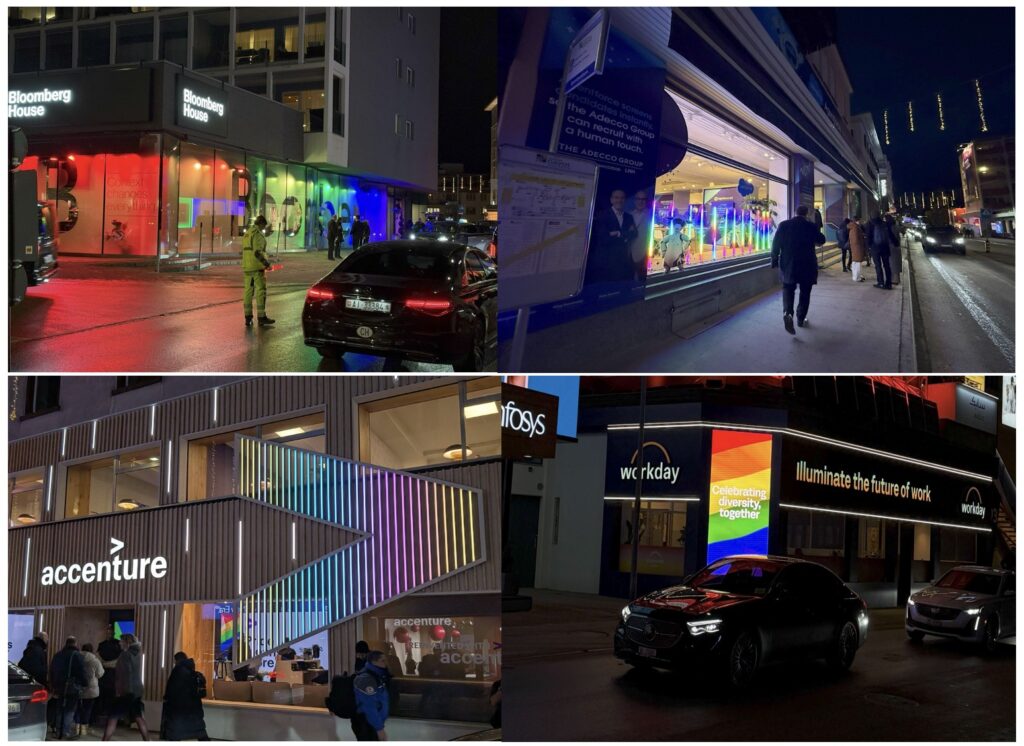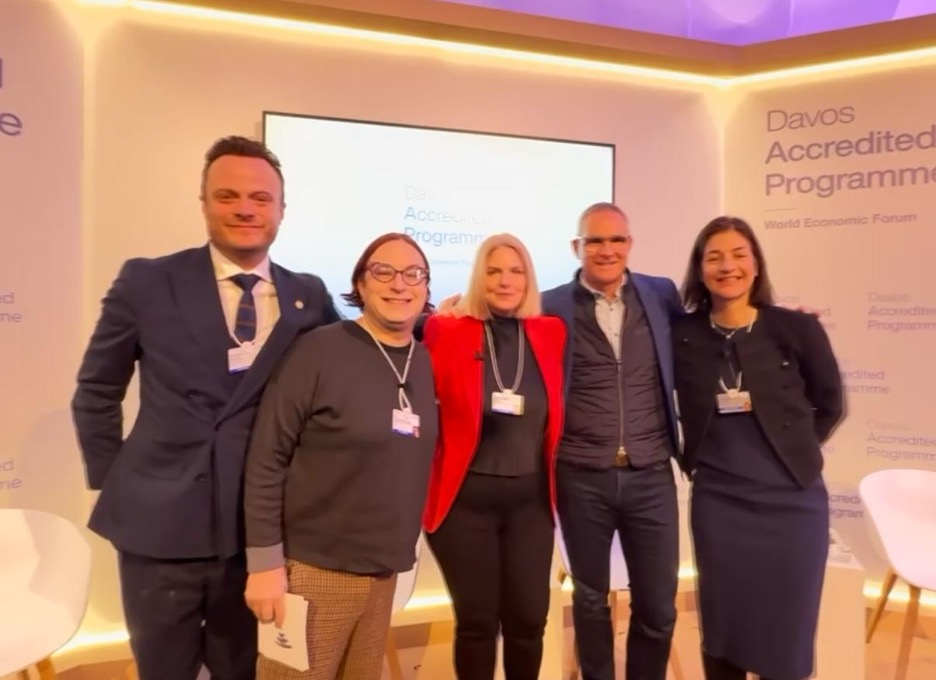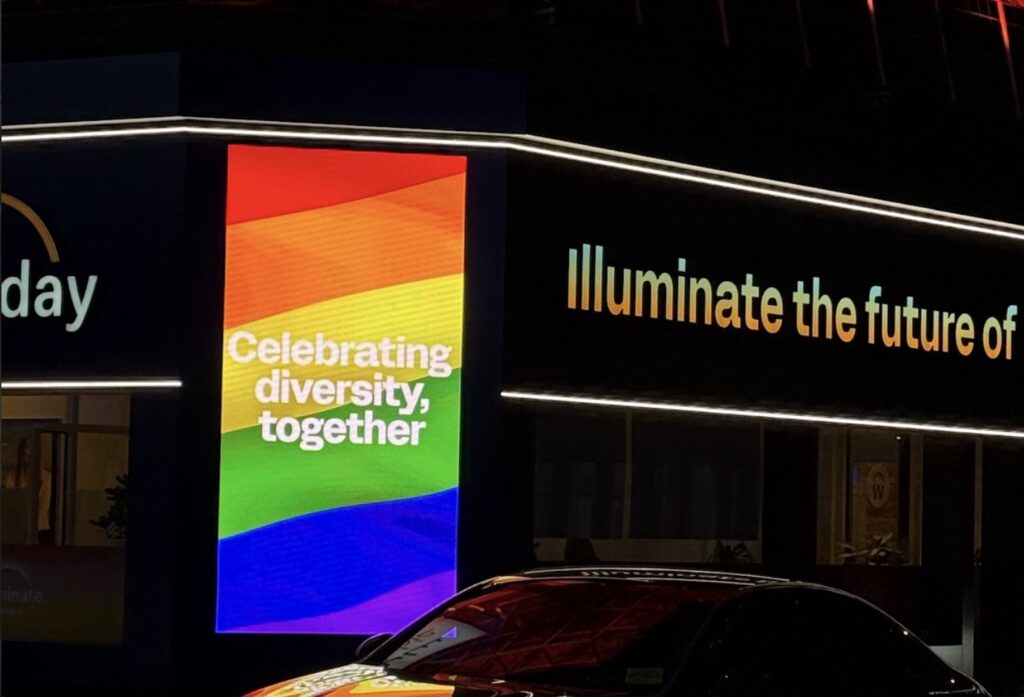Executive Summary
Despite continued political pressures and varying degrees of corporate hesitancy around diversity, equity, and inclusion (DEI) initiatives, the 2025 World Economic Forum Annual Meeting (WEF) in Davos demonstrated remarkable resilience in maintaining LGBTQ visibility and inclusion. This summary of takeaways examines how NGOs and corporate allies are turning to quiet strategies that build power with a shared objective of maintaining best practices for diversity, equity and inclusion, even as some companies express reservations about continued public engagement with these topics.
Current Landscape
The 2025 WEF meeting occurred against a backdrop of intensifying challenges to diversity, equity, and inclusion initiatives and LGBTQ visibility and allyship. As GLAAD President and CEO Sarah Kate Ellis noted at a WEF Open Forum on ‘Protecting LGBTQ Lives’: “The billionaire class is actively working against marginalized communities, particularly the LGBTQ community, using their resources to roll back progress and create division.”
GLAAD was the only U.S.-based LGBTQ non-profit advocacy organization at the World Economic Forum Annual Meeting this year, and was focused on helping other civil society organizations and corporates in attendance respond to:
- Significant political opposition to DEI programs, including widespread defunding efforts.
- Growing anti-LGBTQ sentiment in political spheres.
- Over 200 Executive Orders, including some targeting LGBTQ Americans, which began the week of the Annual Meeting in Davos.
- Increased targeting of marginalized communities through social media algorithms.
- Economic pressures affecting corporate DEI commitments.
Key Developments at WEF 2025
1). Sustaining LGBTQ Visibility
WEF featured several official sessions and GLAAD hosted side events to ensure that the LGBTQ community is front and center with business leaders and governments.
- GLAAD hosted the forum’s LGBTQ-focused accredited session, “The Economic and Business Case for LGBTQI Inclusion” in partnership with Open For Business, Deutsche Bank, and Accenture. Axios Chief Technology Correspondent Ina Fried moderated the panel and spoke about how recent U.S. legislation impact transgender employees and consumers.
- The successful execution of the third annual “Pride on the Promenade” campaign, featuring numerous Corporate lounges, lodges, and meeting spaces lit up with the Pride rainbow colors, followed by a reception hosted at Accenture House.
- The annual roundtable discussion dedicated to addressing LGBTQ criminalization laws globally and sharing where progress has been made and what challenges remain. The session was hosted at the Microsoft Café.
- The World Economic Forum presented a panel discussion and town hall entitled ‘Protecting LGBTQ Lives’ as part of its Open Forum, which welcomes members of the public and is livestreamed. Moderated by Deutsche Wells Senior News Anchor Ben Fajzullin, panelists included Sarah Kate Ellis, famed transgender Chinese TV host and choreographer Jin Xing, Network for Teaching Entrepreneurship CEO Jean Daniel LaRock, as well as Alexander Cheng and Frida Daniela Ruiz, WEF Global Shapers and advocates in Sydney and Mexico City, respectively.
- The week culminated in Hub Culture’s annual LGBTQ Nightcap, an at-capacity event for LGBTQ attendees which included UK Olympic Gold-Medalist diver Tom Daley.

2). Strong Corporate Participation
While the headlines focus on a the few companies who have publicly pulled back from DEI initiatives, many major corporations present at Davos demonstrated continued commitment through active participation in discussions of DEI and LGBTQ inclusion via programming during the Forum and in remarks at other events:
- Professional services firms such as Accenture, Deloitte, Teneo, and EY
- Global financial institutions like Deutsche Bank, Goldman Sachs, JPMorgan Chase, and Mastercard
- Major technology companies including Nasdaq, Microsoft, and Salesforce
- During a panel session, one CEO noted: “I’ve always said that [DEI] is an ‘and’ not an ‘or’… if we can continue to do what we’re doing, let’s not worry so much about the branding of it.”
3). The Economic Case for LGBTQ Inclusion
Speakers at the WEF accredited session “The Economic and Business Case for LGBTQI Inclusion,” organized by GLAAD, highlighted compelling economic arguments for LGBTQ inclusion:
- Global LGBTQ purchasing power estimated at $4.7 trillion.
- Documentation of how anti-LGBTQ legislation impedes business growth and economic potential.
- Emphasis on the business imperative for maintaining inclusive practices.
“What we’re seeing is a coordinated effort to use marginalized communities as a distraction,” Ellis noted in the WEF Open Forum on Protecting LGBTQ Lives. “While they’re keeping us fighting for basic rights, they’re consolidating power and wealth. We need to see through these tactics and continue pushing for systemic change.”
LGBTQ Programming Highlights:
3rd Annual Pride on the Promenade Rainbow Light-up
The third annual “Pride on the Promenade” rainbow light-up in Davos, organized by the GLAAD and the Partnership for Global LGBTIQ+ Equality (PGLE), illuminated multiple venues along the Promenade in rainbow, exhibiting a powerful show of support for LGBTQ people and united call for continued action against discrimination.
Participating companies: Accenture, Amazon, Axios, Bloomberg, Circle, Cisco, Deloitte, Edelman, EY, Google, HP, Hub Culture, IBM, Salesforce, SAP, and Workday.
A crowded, at-capacity reception hosted by Accenture highlighted the economic benefits of inclusion, with speakers urging businesses to take a stand against anti-LGBTQ laws and violence worldwide.

Challenges and Responses
Corporate Hesitancy
While some companies express uncertainty about continued DEI engagement, particularly in public ways, programming during WEF showed the path forward between civil society organizations and corporates:
- Partnering on data-driven business cases for inclusion
- Highlighting economic impacts of discriminatory practices. LGBTQ organization Open For Business presented research that shows Uganda has experienced an economic loss of between $470 million and $1.6 billion in the first year since the Anti-Homosexuality Act passed. This comprises 0.9–3.2% of the country’s GDP.
- Maintaining professional, business-focused dialogue around inclusion initiatives
- The Edelman Trust Barometer noted a drop in consumer trust for corporations, paired with continuing decreases in trust for media and government.
The annual research showed that NGOs present an opportunity where trust is growing, providing an opportunity for more innovative NGO-corporate partnerships.

AI: the Opportunities and Threats to LGBTQ Rights
The theme of this year’s WEF Annual Meeting was “Collaboration for the Intelligent Age” and programming focused heavily on innovation and opportunities around AI. The rise of AI-driven polarization is a double-edged sword, however. While AI offers opportunities for advocacy and innovation, unchecked algorithms amplify hate speech and marginalize vulnerable voices.
- Ensuring AI Equity and Safety: Speakers across sessions emphasized the need for AI systems to be designed with fairness, transparency, and accountability to prevent bias and discrimination against marginalized communities. They called for greater oversight in AI development to ensure equitable outcomes for all users.
- Inclusive AI Development: Business and advocacy leaders highlighted the importance of diverse representation in AI development teams and datasets, stressing that AI should reflect and respect the experiences of LGBTQ individuals and other underrepresented groups. They urged companies to integrate ethical frameworks that prioritize inclusivity in AI-driven decision-making.
Recommendations
- Continue emphasizing economic and business cases for inclusion
- Strengthen coalitions between civil society organizations and corporate allies
- Maintain dedicated spaces for LGBTQ visibility at major global forums
- Document and share success stories of inclusive business practices
- Develop strategies to address corporate hesitancy around DEI engagement
Conclusion
The 2025 World Economic Forum demonstrated that LGBTQ inclusion and DEI initiatives remain a priority for many businesses, even in the face of opposition and uncertainty. Through strategic focus on business cases, strong coalition-building, and persistent advocacy, the forum successfully kept these crucial topics at the forefront of global economic discussions.













